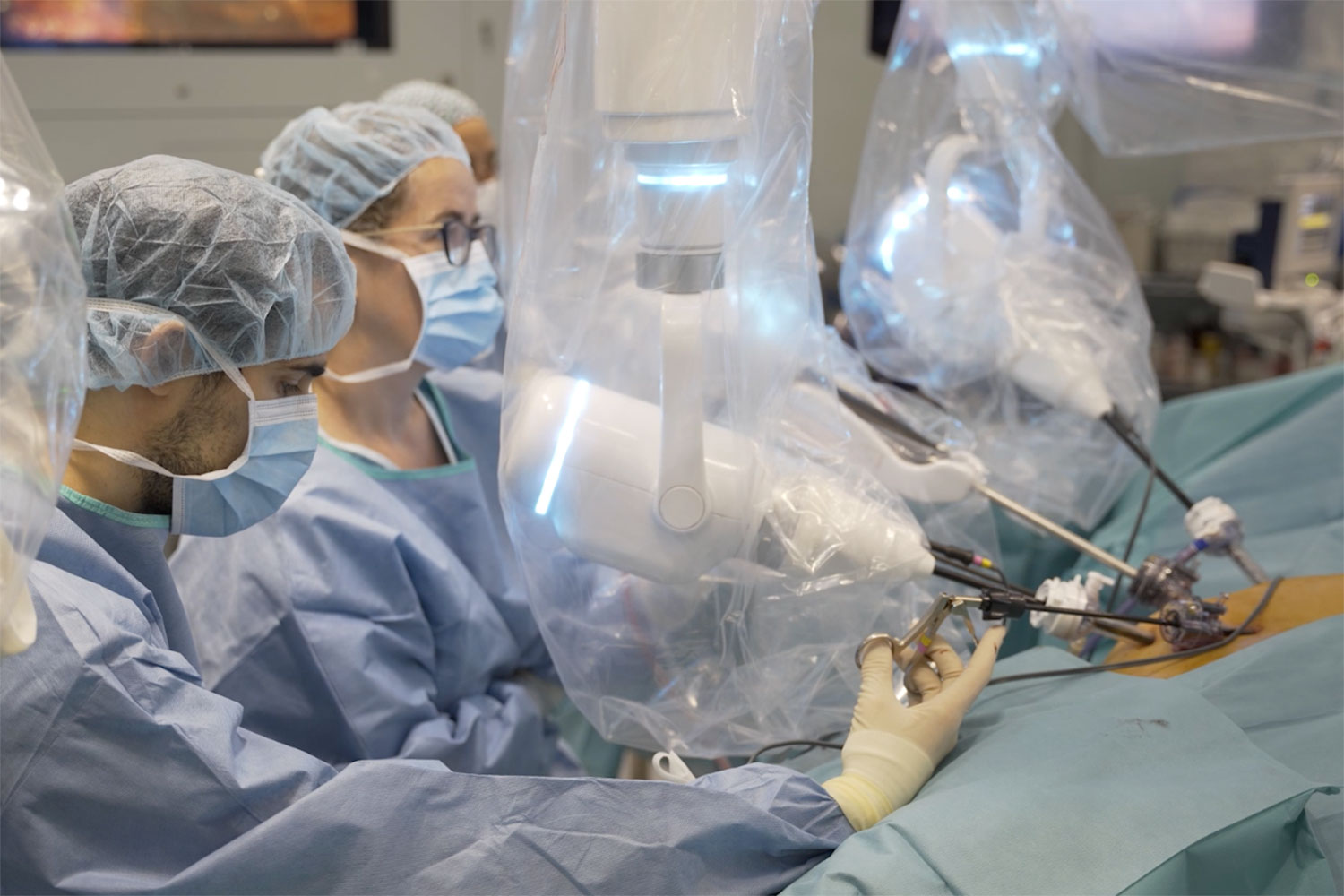- The nephrectomies performed with the surgical robot by the team from the Hospital Clínic’s Urology Service have gone well and no adverse events have been reported.
- Rob Surgical, a spin-off created 12 years ago in Barcelona by the Universitat Politècnica de Barcelona (UPC) and the Institut de Bioenginyeria de Catalunya (IBEC), is the 1st Spanish company to obtain the European certification.
- Bitrack, the robot created by the company, improves the efficiency of current surgical robots, making precision surgery universal and bringing its benefits to all hospitals, surgeons and patients around the world.
Barcelona, Thursday 15 June 2023. The Hospital Clínic Barcelona has successfully performed the first surgeries with Bitrack, the surgical robot created by the Catalan company, Rob Surgical. The first surgeries were carried out by Dr. Lluís Peri, a specialist from the hospital’s Urology Service, which is headed by Dr. Antonio Alcaraz. These first surgeries are part of the collaboration agreement between the Hospital Clínic and Rob Surgical to make progress in precision surgery in the field of Urology.
The surgeries performed by the new Bitrack robot were three radical nephrectomies, operations that consist of the removal of the kidney due to a malfunction or a pre-existing condition. All three surgeries were performed satisfactorily, and, after a 30-day follow-up, no adverse events were observed as a result of the use of the Bitrack system. Dr. Mireia Musquera from the Hospital Clínic Urology Service also participated in these surgeries.
This series of operations is the first step in the clinical validation of the robot’s safety and efficacy for kidney surgery after numerous tests on animal models, which were carried out in collaboration with Specipig (Contract Research Organization focused on the pig model), and on corpse models carried out by CMCiB (Comparative Medicine and Bioimage Centre) at the Germans Trias i Pujol research centre (IGTP). Surgeons from the Mayo Clinic (USA), the Hospital Clínic University Hospital, the Vall d’Hebron University Hospital and the Germans Trias i Pujol University Hospital participated in the preclinical phase.
In April 2023, the company received authorization from the Spanish Agency of Medicines and Medical Devices (AEMPS) and the Ethics Committee of the Hospital Clínic de Barcelona for the clinical trials. The ultimate goal of this patient trial is to certify the robot and start marketing it in 2024. Rob Surgical is the 8th company in the world and the 1st in Spain to obtain authorization to carry out clinical trials in patients with urological diseases.
Rob Surgical improves on current robotics and offers an open, flexible and versatile platform consisting of a column of four arms, which allow the movements of the surgical instruments to be controlled with sub-millimetre precision. The system improves the efficiency of current surgical robotics, allowing for the universalization of precision surgery. Bitrack, the only open-platform surgical robot, is the result of over 10 years of research.
The value proposition is based on three pillars: high precision and safety that benefits the patient, superior usability for the surgeon and a significant reduction in the total cost per surgery that benefits hospitals, as it does not require a dedicated operating theatre, it needs fewer staff, no prior training is required, and it allows for hybrid surgeries.
One of this robot’s differentiating factors is the possibility of performing hybrid surgeries, which allow the surgeon to combine manual manoeuvres (MIS) and robotic methods (MIRS) in the same procedure, thereby taking advantage of laparoscopic surgery and robotic surgery in the same surgical procedure. All this thanks to the use of the same instruments and flexible robotics that allow the robot to intervene only in the most delicate parts.
Moreover, Rob Surgical offers the possibility of automatic camera guidance even when working with manual instruments. Hybrid surgery benefits both the patient and the surgical professional by combining the precision and safety of the robotic system with the medical team’s experience, as it reduces surgery time, thus increasing the turnover of the operating theatre. The possibility of using generic instruments and trocars and combing them with flexible robotics allows the robot to intervene only when needed and reduces the time and cost of each operation.
The clinical study was conducted in accordance with internationally recognized clinical trial protocols established by the Good Clinical Practice (GCP).
Dr. Lluís Peri, from the Hospital Clínic Barcelona Urology Service and the first surgeon to perform a laparoscopic procedure in a clinical setting using Bitrack, says that, “is it good news to have a new surgical robot made in Catalonia. The robot works well, it is easy to use and it integrates very easily into surgical processes. It allows us to have a new quality tool to perform minimally invasive urological surgeries”.
“This new milestone brings the medical robotics technology company closer to its founding purpose: to universalize precision surgery and bring its benefits to all hospitals, surgeons and patients around the world. Moreover, this success is the prelude to the market launch”, points out Jaume Amat, CEO of Rob Surgical.
After the completion of the first series in humans, Rob Surgical will continue working with the Hospital Clínic Barcelona Urology Service on the optimization of the system and the clinical introduction of the Bitrack surgical robot to bring the benefits of precision surgery to all patients in this field. Likewise, Rob Surgical will continue to work in the fields of General Surgery and Gynaecology.
